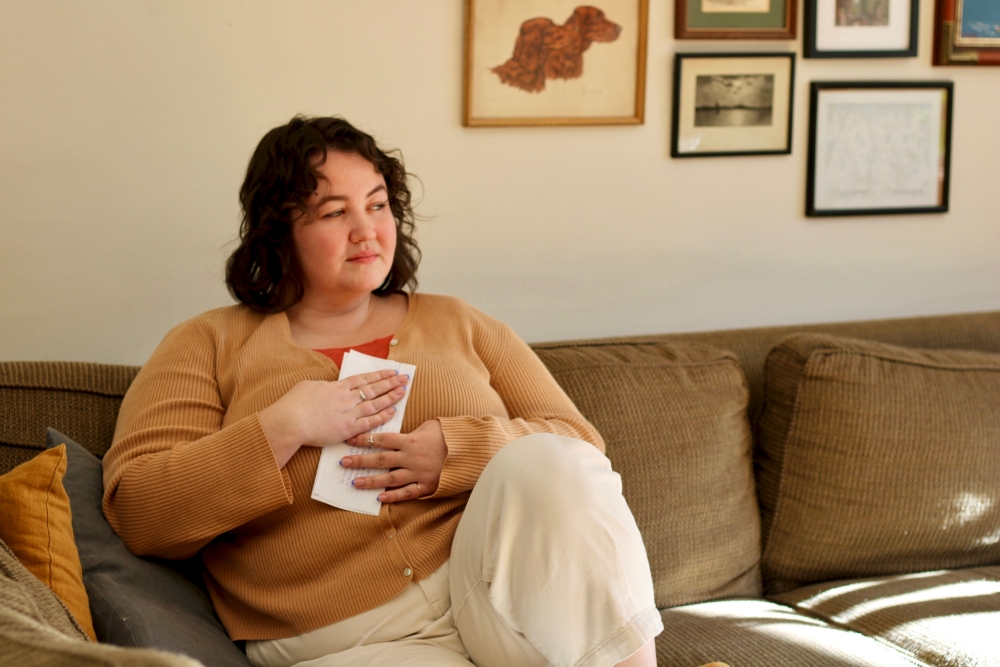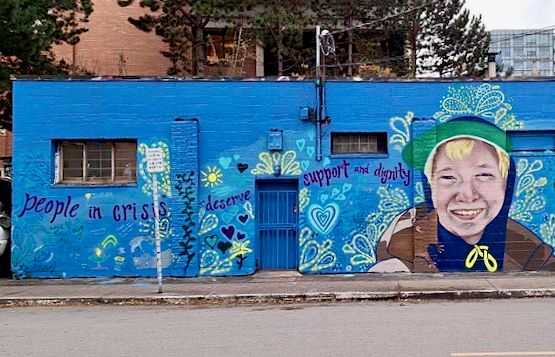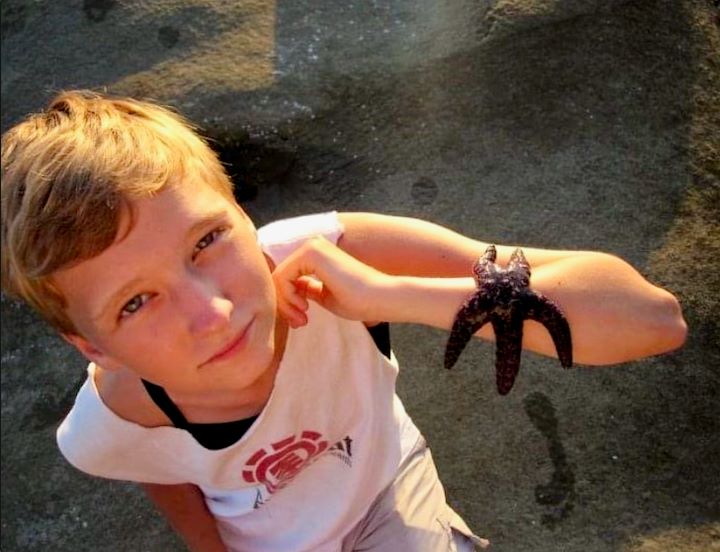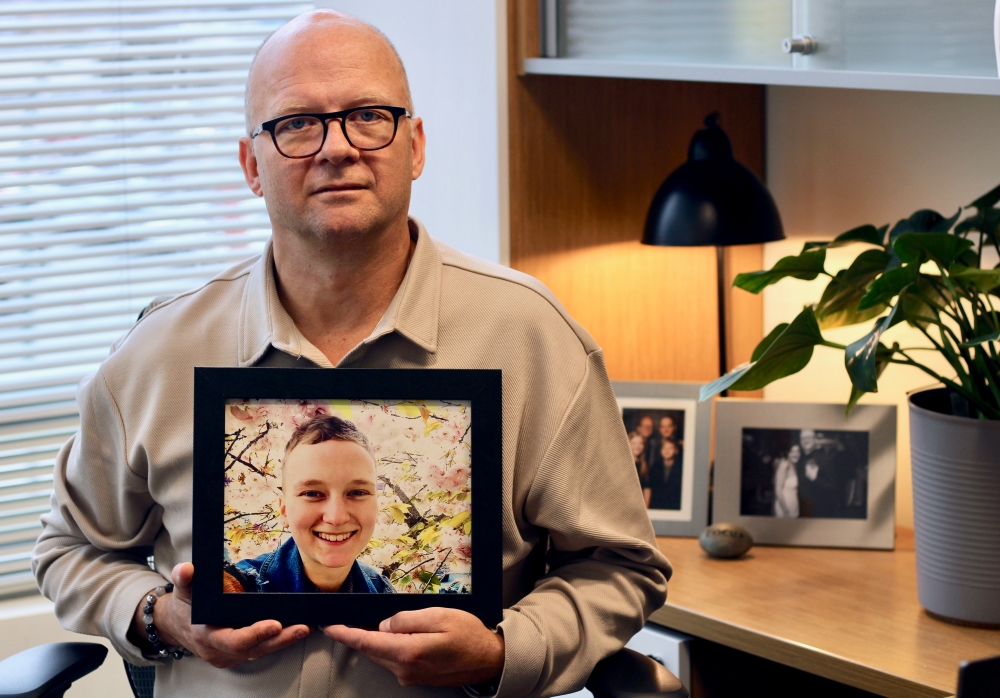[Editor’s note: This story contains details of self harm and police violence during mental health crises that some readers may find disturbing.]
Dani Cooper was Alex Okrainetz’s friend before they became siblings. It was through Dani’s friendship with Alex’s sister that their parents met and married, forming one big, blended family together in a North Vancouver housing co-op, with five kids and a revolving door of exchange students.
“We felt like we were the core of our family,” Okrainetz says. “Because we were the two eldest siblings in the sibling groups. We were really friends and family and, yeah, kind of everything.”
To Dani’s dad, Dennis Cooper, Dani had the most “personal power of anybody I’ve ever met,” despite their small physical stature — they stood five feet tall and were slight, weighing 100 pounds.
“Just the ability to, if somebody says, ‘You're gay,’ or something like that — something attacking — they'd just look into the person’s eyes very calmly. They wouldn't fight or argue, they would just say, ‘Well, I like the way I am.’”
Dani’s family, their large circle of friends, fellow trans and queer rights activists, and the North Shore Unitarian community that Dani had been a part of since childhood are now struggling to make sense of the 27-year-old’s death.
On Nov. 12, 2022, North Vancouver RCMP officers shot Dani, who was also known as Maiken, after being called to the home where they lived with their mother. Dani was trans and non-binary.
Dani had been diagnosed with schizoaffective disorder, a mental health disorder that can display a combination of symptoms of schizophrenia and mood disorders such as depression. At times, they suffered from bouts of psychosis that they found terrifying and consistently sought support to manage. The day they were killed, Dennis said, Dani “thought that their mother had been overtaken by an alien replicant, and they picked up a knife, to — this sounds a little twisted — to defend their mother.”
Dani’s mom managed to wrestle one knife away from them, but when they picked up another knife, Dani’s mom ran outside and called 911. At some point during the crisis, Dani also attempted to enter a neighbour’s apartment.
Fifteen minutes after the 911 call, “they were shot,” Dennis said.
‘They aren’t themselves’
Dennis, Alex and others who knew and loved Dani can’t understand how this could have been the response to someone in the midst of psychosis, who couldn’t control their own actions and was not able to comply with officers’ orders.

It’s an issue that has affected other families in Canada. In January 2021, Vancouver police shot Chester Libo-On five times just six seconds after officers arrived at East Hastings and Princess Street. Libo-On had been naked on the street brandishing a sword at passersby, repeatedly harming himself and saying he wanted to die. When Libo-On saw the officers, he walked towards them with the sword raised.
In 2020, RCMP officers in New Brunswick shot Rodney Levi after he refused to drop two knives. During the interaction with police, Levi had told officers he was suicidal. He did not survive.
In 2019, four Maple Ridge RCMP officers attempted to take Kyaw Din, who lived with schizophrenia, to hospital at the request of his family members. But the officers ended up fatally shooting him after Din attempted to cut an officer with a paring knife.
“They aren’t themselves — they become violent or frightened or paranoid. When I hear of these incidents, I always think, ‘Oh, thank goodness it wasn’t my daughter,’” Shirley Chan, the vice-president of Pathways Serious Mental Illness Society, told The Tyee in a previous interview.
Dani’s death has led to renewed questions and criticisms of the role of police in responding to people in psychosis, and what can be done to keep them safe.
It’s a cause Dani themselves championed before their life was cut short.
Dani had had negative experiences with police officers in the past and feared them, Dennis Cooper says. In 2018, Dani wrote an article for the online publication the Volcano, arguing that including police on emergency mental health teams is a harmful practice.
There are emergency mental health teams operating in some B.C. communities that don’t include police, including North Shore Peer Assisted Care Team, in North Vancouver where Dani lived. The B.C. government recently announced plans to expand the PACT model to 12 more communities in B.C., bringing the total number of PACT teams in the province to 15.
But those civilian teams, or even programs that pair a police officer with a psychiatric nurse or mental health professional, would not have been sent to a call that involved a person with a weapon. Some abolitionist organizations say the existence of PACTs serves to reinforce the role of police in mental health response because the teams are considered “an auxiliary service to the police” and “further entrench the role of policing.”
Reducing police involvement in mental health calls wherever possible is still important, said Jonathan Morris, CEO of the Canadian Mental Health Association in B.C., which runs North Vancouver’s PACT and two others in Victoria and New Westminster.
“People want a civilian response,” said Morris in a November interview. “It ultimately frees up police and the justice system to serve their mandate and reduces the risk of fatality and injury.”
Despite recent efforts to remove police from non-violent calls, police also remain the only responders available 24-7 for crises in B.C.
A call for better police training
B.C.’s Independent Investigations Office is now investigating the incident that led to Cooper’s death. The IIO investigates all police-related incidents where death or serious harm occurred, and Ron MacDonald, the civilian director of the agency, says the IIO’s caseload has doubled in the past five years.
Speaking generally and not about the Cooper investigation, MacDonald said it’s clear that there needs to be better training for police officers, particularly when they are responding to someone in mental health distress who can’t comply with their orders.
“I do believe that there needs to be further and better training for police, right across this country, on issues of de-escalation in particular,” MacDonald said.
“On too many of the files I have seen, the approach taken by officers seems to demonstrate that they haven't been well enough trained in those areas.”
Charges are rare in these cases in B.C., a recent Globe and Mail investigation found. Since 2012, the IIO has investigated the deaths of 220 people in police interactions, recommending charges in only 14 cases. The Crown laid charges in only one of those cases.
‘When a weapon is involved, it changes everything’
As Dani’s family waits for answers, The Tyee asked policing and mental health experts how some police responses to serious mental health calls go so wrong and what that means for the future of mental health crisis response.
Despite increasing training in serious mental illness and de-escalation, experts say the mandate of police is fundamentally at odds with what those asking for support during a mental health crisis want. For people who call 911 for help with a loved one, they want to keep them safe.
“Things start to happen when someone calls 911. It’s a crisis, and they want help for their loved one, and they’re maybe fearing for their own safety,” said Lisa Kofod, a former Vancouver police officer who retired last fall. “There is a huge gap between what [the family] hopes for help and what it looks like when it arrives.”
Police take a broader look at public safety when arriving on a scene where there are reports of a weapon or violent behaviour, said Kofod. Their response becomes less focused on the individual and more about ending any perceived threat to public or officer safety.
“When a weapon is involved, it changes everything. It’s no longer a wellness check, and more officers will attend,” said Kofod, who now sits on the public policy committee for the BC Schizophrenia Society. A close family member of hers also lives with schizoaffective disorder.
MacDonald confirmed that the police response to the call about Dani’s behaviour was not a wellness check.
“This was not that type of case at all,” MacDonald said. “This was a case where police were called to a situation where an individual had threatened several different people with serious bodily harm with a weapon.”
Police arriving on the scene can make people who are experiencing psychosis and delusion more agitated, Kofod said. Psychosis and delusion are common symptoms of mental illnesses such as schizophrenia, schizoaffective disorders and bipolar disorder.
Individuals in psychosis can have trouble judging time and space, be confused, feel threatened by individuals or their surroundings and hear voices urging them to do or say certain things.
Okrainetz recalls Dani describing their experience with psychosis as “losing time.”
“I can just be at a bus, I want to go somewhere so badly and be ready to go there and go outside and be at the bus stop, and then something shifts and I have been at the bus stop for nine hours and I can't go anywhere,” Okrainetz remembers Dani telling her.
Experts shared that the typical de-escalation tactics and risk assessments used by police often don’t take into account the altered perception of reality someone in psychosis or deep mental distress is experiencing.
Delusions, and how to de-escalate
Most delusions are not violent, and people with serious mental illness are more likely to be victims of violence than to commit it themselves.
These risks are even higher for Indigenous, Black and racialized people in crisis. Research suggests that others, including police, are more likely to perceive them as dangerous and aggressive than a white person with the same behaviours as a result of racist stereotypes.
And when people in delusion or psychosis have a weapon, the risk assessment by responders becomes more complicated, because the individual is perceiving a different reality than others.
Often they are unable to listen to or follow instructions from police, particularly if they are hearing voices. Police presence may exacerbate the feeling they are being threatened or are in danger.
“It's a very stressful experience,” said Bradley Aldridge, a member of the BC Hearing Voices Network who has experienced mental health crises police were called to.
“If you're paranoid, and you think people are out to get you, and then uniformed people with weapons are trying to arrest you, that’s really stressful. I feel like it just escalates things.”
Everyone experiences psychosis differently, says Aldridge, but it’s almost always “frightening” for the individual themselves.

Whether police are responding with or without a trained mental health professional, Kofod says listening to the individual and getting information from the family is key to de-escalating the situation safely. “Their reality is not ours at that moment,” Kofod says.
If loved ones can share what the individual has said or experienced while in psychosis in the past and what has worked to end other crises, police have more context to judge risk and engage the person safely, she said, a finding echoed in a 2014 report from the Mental Health Commission of Canada.
A breakdown in information-sharing between his family and police could have cost Aldridge his life.
About five years ago Aldridge, who experiences suicidal ideation and has at times been diagnosed as delusional, was living with his family in the Lower Mainland. He was in crisis and reached for scissors to use to harm himself.
His family stopped him before he got to the blades and called the police while Aldridge sat on the ground. But police entered aggressively, shouting at Aldridge and threatening him to comply with their orders.
“They'd heard over the radio that I was threatening people with the scissors. And I wasn't, I was just sitting there,” said Aldridge, who now studies philosophy at UBC. “And then they came in and they calmed down a little bit and said there had been a miscommunication.”
Aldridge has had multiple interactions with police when he has been in crisis, some resulting in his admission to hospital for care.
This past fall, for example, he had cut his own wrist and called 911 to be taken to hospital. Instead of an ambulance, police arrived outside his residence at the University of British Columbia. They handcuffed him and drove him to the hospital, where staff declined to admit him despite his request.
“It was a really frustrating experience for me because I was totally compliant, I was asking for help and to go to the hospital. I did everything I was supposed to do, and they were still treating me like this potential source of violence,” said Aldridge.
‘Dani did not need to die’
Learning more about the nature of psychosis, and how to identify and engage someone experiencing it is also key, said Kofod. The BC Schizophrenia Society co-developed a training module on mental illnesses and disorders with the VPD in 2020 that all current and new officers are required to complete.
In B.C., all frontline RCMP police officers and their supervisors are required to take Crisis Intervention and De-escalation Training, according to information provided to The Tyee by the RCMP. This training is based on the Vancouver Police Department’s Crisis Intervention Training, and it teaches officers to “de-escalate crises using verbal and non-verbal communication.” B.C.’s provincial policing standards require officers to retrain every three years.
Knowing how to identify people in mental health crisis and receiving good information from their family helps police officers tailor their responses. “The worst thing is having too little information about something and thinking we know enough,” said Kofod of police responding to a call.
Little information is available about what happened during the RCMP’s interaction with Dani before they were shot and killed. But their family, alongside community advocates who have rallied behind them, are asking why police were unable to de-escalate or to secure a person so small in stature without shooting them.
“Dani did not need to die,” Pivot Legal campaigner Meenakshi Mannoe wrote in an op-ed in Xtra Magazine. “Their death was made possible by an unjust system of social, economic and political relations that devalues queer life and joy, and justifies the use of police violence against marginalized or ‘disruptive’ individuals.”
Speaking generally, Kofod said small weapons, such as the steak knife Dani reportedly held, can do a lot of damage in a very short amount of time.
“These are tragic circumstances. A person in psychosis can often be trying to defend themselves,” said Kofod, noting the stabbing death of a Burnaby RCMP officer in the fall who was checking on a man living in a tent.
“It doesn’t matter how small someone is, if they can move quickly and strike violently, they can cause a lot of damage.”
While Aldridge says this isn’t an option for everyone, he says that when he feels suicidal or worries he is deluded, he prefers to call a friend who has similar experiences to talk him through it without countering his experience.
“They just listen to what I say… and they ask some questions without trying to challenge my perception of reality,” said Aldridge.
“There's no perfect solution. But I think going more slowly, instead of just trying to disarm the person as quickly as possible, and trying to listen to them is important. And then they might voluntarily put down the knife instead of there being unnecessary violence.”
Neil Gross, a professor of sociology at Colby College in Maine, said time and distance are key factors in police being able to respond in a way that doesn’t end in injury or death for the person in crisis.
Gross briefly worked as a police officer in his early 20s and recently wrote a book about how to improve police culture and practices. He said some police forces have been successful in developing a culture where preserving lives is “the utmost priority.”
“When dealing with someone who is armed, if there's a possibility to slow down the interaction and create more distance between the officer and the individual, that gives more time to the officer to implement the escalation strategies or to reach for less lethal weapons,” Gross said.
Gross noted it’s not always possible: if the person in crisis has a weapon, is in a public place and there are other people around, police may not be able to wait to act.
Trauma in interactions with police and the medical system
A 2020 survey of 50 families conducted by Kofod for the BC Schizophrenia Society found that while many had had positive interactions with police when their loved one was in crisis, the trauma from negative interactions with police was often long-lasting for the individual and their family.
After a police response terrified and traumatized one woman with schizophrenia, her sister wrote that calling 911 will never again be an option for their family.
And when families called for help from teams like VPD’s Car 87 and Car 88 that pair a mental health worker with a police officer, they were often not available or didn’t exist in their area at all.
Many of these calls are coming after efforts from the individual and their family to find support and resources to diagnose and manage their conditions, Kofod added.
In Dani’s case, they had sought long-acting antipsychotic medications, which are injected, to eliminate the possibility of forgetting or deciding not to take their pill each day. Okrainetz said that on several occasions when she accompanied Dani to doctor’s appointments, they were unable to get more than a week’s worth of even their daily medications, despite asking for a longer supply.
“I remember asking the doctor, ‘Do you think Dani's gonna sell them? Like they're telling me that when they're off their meds, they're losing time, they're having psychosis. Do you have a reasonable explanation as to why they can't have longer than a week's worth of prescription or two weeks even?’” Okrainetz said. “And we never really got anywhere with that.”

Before their death, Dani had switched from pill medication to injections, and was getting those every three weeks, Cooper said. But the last two years before their death were particularly hard.
“They were suffering hard,” he said. “They were in psychosis on a regular basis.”
Dani’s use of opioids may also have affected how well the anti-psychotic medication was working. Family members noticed that when Dani’s drug use spiked, psychosis would inevitably follow. Cooper said Dani used drugs to deal with past trauma. In high school, other students had violently bullied Dani because they were transgender.
“They were literally stripped and dragged into the forest in high school,” Cooper said. “Just crazy, crazy stuff.”
Mental health services, including crisis response, safe and dignified inpatient and outpatient treatment, medication, housing and community-based peer supports need to be sufficient to prevent episodes of psychosis that may be violent in the first place, said Kofod.
In 2021, the province expanded its early psychosis intervention program for children and youth. In late January, B.C.’s chief coroner again stressed that mental health and substance use treatment in B.C. is not accountable, co-ordinated or regulated enough for the province to assess where it is failing or succeeding.
And Dani’s search for support illustrates that even those who do ask for help and have family to advocate for them don’t always get what they need.
A call for affirming, inclusive care
Transphobia also shaped Dani’s interaction with police and the medical system, Dennis and Alex recall. Trans people experience psychosis at slightly higher rates than cisgender people, but research notes clinical care often does not consider their unique needs.
Aldridge, who is also trans, says police and health-care workers avoiding misgendering people is a bare minimum, but he is more concerned with having well-rounded safe, respectful and dignified care.
“If the actual way the system interacts with people is still coercive, it doesn't matter if you have a little rainbow sticker on it,” said Aldridge.
Dani’s family says that a lack of information about what happened when police arrived has compounded their pain. Cooper says all he knows is that Dani died from “at least one” gunshot wound. The family has tried to get a copy of the coroner’s report and the hospital report, but have been told those documents won’t be released while B.C.’s Independent Investigations Office is still investigating.
MacDonald said he understands that families find the wait frustrating, but investigations need to proceed carefully because they may result in criminal charges. If too much information is released, that could impact the ability to hold a fair trial, MacDonald said.
MacDonald said the IIO aims to complete investigations in nine months, but more complicated cases are often taking much longer. Part of that delay comes down to the IIO being understaffed for the number of investigations it handles, MacDonald said.
Cooper said waiting for basic information about Dani’s injuries is unacceptable. He said his efforts to seek justice and accountability for his child feels like a part-time job in addition to managing his own grief and full-time job.
Cooper has been finding solace visiting a mural of Dani outside the Wildfire Bakery in Victoria. He recently mixed some of Dani’s ashes into the pigment to paint another heart on the piece.
“We've had a couple of conversations with the IIO investigators,” Cooper said. “And I've said, ‘Look, I understand that some of the stuff is subjective, like whether the police felt threatened or whether they didn't, whether they were being charged by a person with a weapon or whether they weren't.’
“But how many bullet holes is in my [child] is not subjective.”
— With files by Katie Hyslop
* Story edited on Feb. 17 at 5 p.m. to correct information about Dani Cooper’s and Alex Okrainetz’s friendship and their parents’ marriage. ![]()
Read more: Health, Rights + Justice, Gender + Sexuality


















Tyee Commenting Guidelines
Comments that violate guidelines risk being deleted, and violations may result in a temporary or permanent user ban. Maintain the spirit of good conversation to stay in the discussion.
*Please note The Tyee is not a forum for spreading misinformation about COVID-19, denying its existence or minimizing its risk to public health.
Do:
Do not: